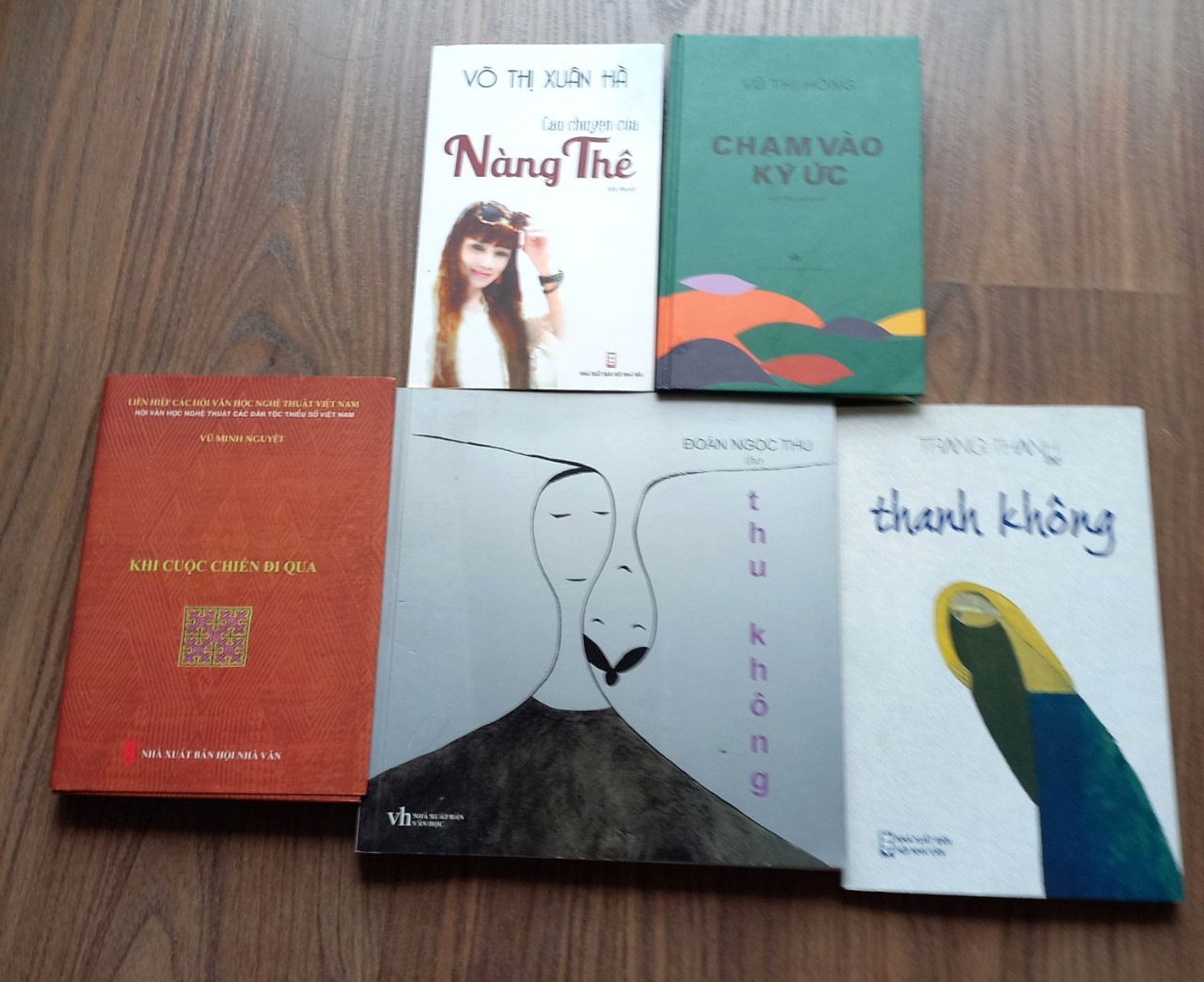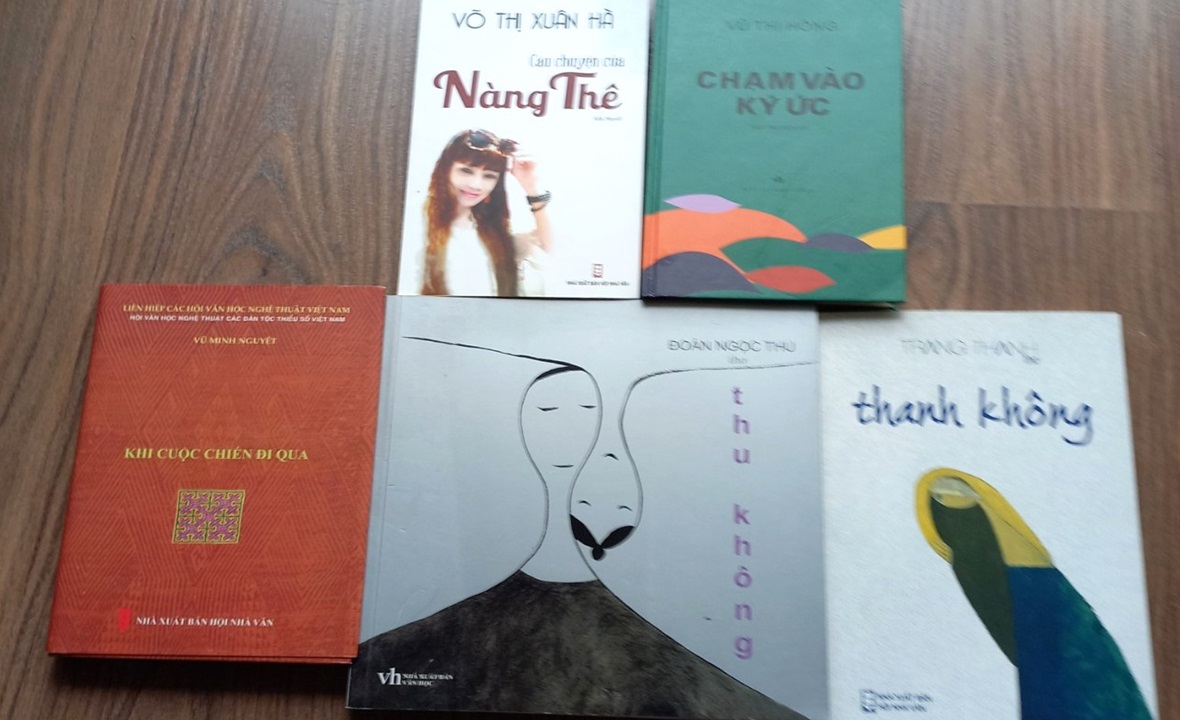According to the book Modern Vietnamese Writers (Vietnam Writers Association Publishing House, 2020), out of a total of 1,623 members (including more than 200 female members), 134 members come from the Faculty of Literature, Hanoi University (now Hanoi National University). Among these 134 members are 35 female writers belonging to three main specialties: Poetry (15), Literature (11), Theory - criticism and translation (9). As Spring comes, I want to sketch sharp and concise sketches of the formation of a powerful and talented group of them in the long tradition of the Faculty of Literature. Thus, when saying "Literature Writers," people often think of writers who come from Hanoi University. As history has recorded: On October 10, 1945, President Ho Chi Minh signed a decree establishing the Faculty of Literature (then called the Faculty of Literature, and shortly afterwards, a document from the Ministry of National Education stated it as the Faculty of Literature under the Vietnam National University in Hanoi).
In the field of prose, a group of 11 female writers has emerged, with names already familiar to readers nationwide: Hong Due, Vu Thi Hong, Le Phuong Lien, Le Thanh Nga, Nguyen Phuong Lien, Nguyen Thi Ngoc Hai, Nguyen Thi Thu Hue, Thu Trang, Vo Thi Hao, Vo Thi Xuan Ha, and Vu Minh Nguyet. Among them, some lived through the war during the "red fire and cold water" era, such as Nguyen Thi Ngoc Hai, Hong Due (1944-2015), and Vu Thi Hong. Their works therefore possess the bitter taste of life, the nobility of a spirit of dedication, and a writing style that is always calm, simple, and self-possessed, without the noise and commotion of later generations. They write about a time to live, a time to love amidst the flames of war. The characters in their works are ordinary people, with many experiences, carrying within them the extraordinary of their time. Their literature aims for beauty and heroism. The later generation, including Lê Phương Liên, Thu Trang, Lê Thanh Nga, Nguyễn Thị Thu Huệ, Võ Thị Hảo, Võ Thị Xuân Hà, and Vũ Minh Nguyệt, were widely exposed to the atmosphere of literary renewal, so their writing seems more enthusiastic and free-spirited. Their works focus on the myriad aspects of everyday life, but at the same time, they do not forget to raise a strong and heartfelt voice for women's rights. In literary circles, the "group" of successful female prose writers today often includes the names of female writers from the Faculty of Literature such as Võ Thị Xuân Hà, Võ Thị Hảo, and Nguyễn Thị Thu Huệ. Some call them the "Rook - Cannon - Knight" trio in the short story genre. In our opinion, this is not an exaggeration. Literary researchers still acknowledge that "Prose is the face of literature during the Renewal period." Some even liken "Vietnamese literature to a woman's face" (referring to the humanistic, subtle, balanced, harmonious qualities and many spiritual elements of Vietnamese literature). Female writers excel in short stories – a genre that directs the writer's gaze towards the beauty of balance, harmony, and proportion. Female writers from the Faculty of Literature truly contribute to elevating the status of the national short story in the modern era. If we speak of the future of the Vietnamese short story genre, it is the female writers from the Faculty of Literature who have made significant efforts in designing and weaving that future.

In the field of poetry, the lineup of female poets from the Faculty of Literature, Hanoi University, includes prominent names such as Bui Sim Sim, Bui Thi Xuan Mai, Doan Thi Ngoc Bach, Doan Ngoc Thu, Ha Phuong, Hoang Kim Dung, Le Minh Hoai, Le Thu, Nguyen Thi Hong, Phan Huyen Thu, Tran Thi Thang, Truong Thi Kim Dung, Tuyet Nga, Y Nhi, and Trang Thanh. The older generation of poets like Le Thu, Y Nhi, Nguyen Thi Hong, and Ha Phuong are outstanding figures in modern Vietnamese literature. For example, poet Le Thu directly participated in the liberation and takeover of Quy Nhon town, Binh Dinh province in 1975. She was a member of the National Assembly in the 9th term (1992-1997) and former President of the Binh Dinh Association of Literature and Arts. Poet Le Thu has published 10 poetry collections. Her poetry is imbued with civic lyricism, yet it does not diminish her personal lyricism. Her poetry does not detach itself from life because it is firmly rooted in the ever-green tree of life. Y Nhi is also a talented poet. She is considered one of the post-war "Renovation" poets. Her poetry is passionate but not weak, profound but not mysterious, possessing the beauty of solitude but not loneliness, and filled with beautiful sadness. She has published 10 poetry collections and received the Vietnam Writers Association Award in 1986 for her collection "The Woman Sitting and Knitting." In 2015, she was honored with the Cikada Literary Prize from Sweden. Few people know that she is also a football fan, often cheering for national teams with handsome players such as France, Italy, and Spain. A younger generation of poets rising in the atmosphere of literary renovation includes Tuyet Nga, Doan Ngoc Thu, and Phan Huyen Thu. Some call them the "three pillars" of contemporary women's poetry, and that's not an exaggeration. However, the one who has caused the most controversy in the poetry world is Phan Huyen Thu with her three poetry collections, each time they appear, they ignite public debate (Lying on My Side, Empty Chest, Independent Scar). If we consider it, these might be explorations and experiments that this poet may not yet have reached her goal. Tuyet Nga received the Vietnam Writers Association Award in 2003 for her poetry collection "Illusions." Tuyet Nga is a poet with many facets of her life. The transcendence of fate reflected in her poetry is profound and subtle. Doan Ngoc Thu can be considered a "two-in-one" phenomenon (journalism and poetry, excelling in both fields). There are those who achieve fame in silence, such as Le Minh Hoai, Truong Thi Kim Dung, Hoang Kim Dung, Bui Thi Xuan Mai, and Doan Thi Ngoc Bach. Their poetry is modest, discreet, refined, and profound. Their poems are like whispered voices, kindred spirits and confidants. They leave behind many lingering impressions and echoes. Many express concern, "Where is poetry going?" in a context where visual and auditory culture is overshadowing reading culture. But if it is good, poetry will still exist in a dignified manner as a sophisticated and sacred art of language. Thankfully, the female poets of the Faculty of Literature are the owners of many beautiful poems (even though poetry is difficult to sell today, it is Beauty, a precious Gift that nature has bestowed upon humanity).
The literary theorists, critics, and translators are less young than those in poetry and prose. This is understandable, as this field demands a high level of accumulated experience, extensive knowledge, and patiently honed writing skills, often resulting in a late appearance on the literary scene. Fortunately, among today's literary theorists, critics, and translators, female writers from the Faculty of Literature, Hanoi University, have made significant contributions. Their names have become firmly established in the minds of readers: Bich Thu, Luu Khanh Tho, Ly Hoai Thu, Mai Huong, Ngoc Trai, Nguyen Thi Minh Thai, Thanh Duc Trinh Bao, Thieu Mai, and Ton Phuong Lan. Writer Ngoc Trai, former Deputy Editor-in-Chief of the Literature and Arts Newspaper, is now in her nineties. She doesn't write much criticism, nor does she write continuously. But, as the ancients said, "quality over quantity." Her work, "Interviews with Writer Nguyen Tuan," has been widely received and reprinted many times. Her work reflects a meticulous and professional style, combining literary and practical qualities. She was also an active social activist in the Vietnam Red Cross Society. Writer Thieu Mai (1935-1995), former Head of the Literary Criticism Department of the Literature and Arts newspaper, was a systematic, serious, measured, and insightful literary critic. During her lifetime, she always believed that "Literary criticism is like a winding river between the banks of Science and Art" (Self-confession). A group of female critics emerged after the Doi Moi (Renovation) period (1986), including Mai Huong, Ton Phuong Lan, Bich Thu, Nguyen Thi Minh Thai, Ly Hoai Thu, and Luu Khanh Tho. These are six female writers with high academic titles and degrees (all Associate Professors and Doctors). They were lecturers at Hanoi National University and senior researchers at the Institute of Literature. They broke free from what some call "academic institutions," or even, as some have said, "academic elites," to live and work with contemporary literature. Their subject matter is modern Vietnamese literature (in various movements, styles, and genres). Their works don't have the grand scale of their male counterparts, of course. However, they possess a profound and subtle depth in their poetic appreciation and literary criticism. The concept of "Post-1975 Writers," recently introduced at a national-level scientific conference, includes notable female writers from the Faculty of Literature, Hanoi University (Writer Bich Thu wrote a comprehensive and insightful essay – "Female Researchers and Critics After 1975"). Writers Bich Thu and Ly Hoai Thu both received the Central Council for Literary and Artistic Criticism Award in 2015 and 2016. Literary translator Thanh Duc Trinh Bao focuses on modern Chinese literature in his translations. It's a great literature, close to us due to cultural similarities. Literary translation is a difficult artistic endeavor. Many readers prefer the translation of the Lu Xun Literary Prize-winning anthology of Chinese short stories by translator Thanh Duc Trinh Bao.
As spring arrives and Tet (Lunar New Year) approaches, I would like to share with readers near and far a glimpse into the lives of 35 female writers from the Faculty of Literature, Hanoi University (now Vietnam National University, Hanoi), who can also be affectionately called the female writers of the Faculty of Literature.
Hanoi, December 2023

